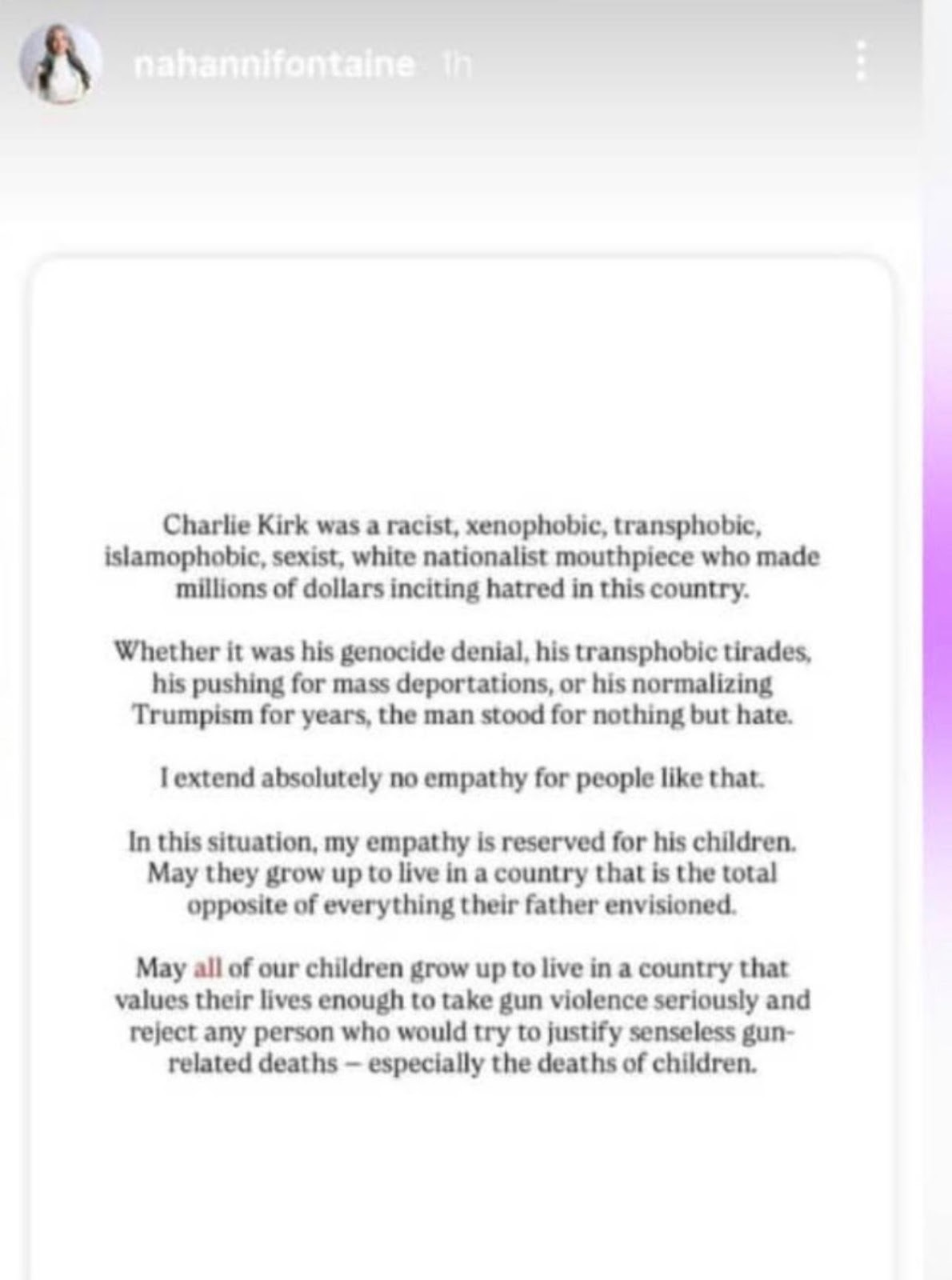OP-ED: No consequences for Manitoba NDP minister’s spiteful Charlie Kirk post
"In an Instagram post, Fontaine repeated that Kirk was 'a racist, xenophobic, transphobic, islamophobic, sexist, white nationalist mouthpiece.'"
Author: Hymie Rubenstein
Nahanni Fontaine, indigenous member of Manitoba’s legislative assembly, was recognized as a “beacon of advocacy and leadership” in April 2024.
Her biography claims, “These academic achievements laid the foundation for her profound understanding of Indigenous rights and social justice issues.”
Unfortunately, this “profound understanding” of indigenous issues has not extended to tolerance for the rights, safety, and well-being of other groups, ethnicities, or individuals.
Fontaine’s steady rise to power in 2023, including being named Minister of Families, Accessibility, and Gender Equity was badly shaken, however, after she used her privileged position to block the use of American Sign Language (ASL) for people with hearing disabilities at a graduation ceremony for indigenous women on June 26, 2025.
The next day, Fontaine issued an apology stating her comments about not wanting to share the stage with a hearing-impaired ASL translator were an expression of frustration over her “poor planning ensuring clear sight lines for all graduates,” ignoring that both women were facing the seated audience and that ASL translations are most effective when the speaker and signer are standing side-by-side.
She has just been forced to make another apology for outrageous behaviour after facing a backlash for reposting callous remarks about American conservative activist Charlie Kirk, who was assassinated on September 11 during an event at Utah Valley University.
In an Instagram post, Fontaine repeated that Kirk was “a racist, xenophobic, transphobic, islamophobic, sexist, white nationalist mouthpiece” and wrote, “I extend absolutely no empathy for people like that.”
Nahanni Fontaine Instagram Post Image courtesy of Instagram
Fontaine added that her empathy was reserved for his children.
The post drew swift criticism online, with opponents calling the language derogatory and again urging Premier Wab Kinew to discipline or dismiss her.
On the same day, Premier Wab Kinew revealed that he had spoken to Fontaine after he found out about the post and asked her to issue an apology.
In response to a request from CBC Manitoba, Fontaine's press secretary on Friday, September 12 released a statement from the minister:
"I apologize for sharing a post yesterday on the murder of Charlie Kirk. Violence has no place in our democracy. Political debate is achieved with words and discussion," it read. "In a world too often divided, we should strive to show empathy to everyone even those we don't agree with."
Kinew told reporters during an unrelated funding announcement that "I wrote my will before the last election … because I recognize that there is a non-zero possibility that being a person in the public eye, I can be, you know, somebody who has some violent thing like this happen."
"I asked our minister to apologize because I want us to be … a force for openness and dialogue and taking the temperature down," Kinew said.
Kinew also said that while her reposting was concerning, she will remain in cabinet.
The episode has intensified debate over the tone of political speech in Canada and the US.
It also raises questions for the NDP Manitoba government about standards for cabinet communications during periods of horrific and divisive conflict.
Christopher Adams, an adjunct professor of political studies at the University of Manitoba, said the original repost by Fontaine speaks louder than her apology.
"When you share something, you're implicitly saying that you support what's being said," Adams said.
"The fact of the minister is sharing something, which is really a piece that criticized the man who was assassinated, is sort of crossing the line for a cabinet minister."
Fontaine needs to learn to take more of a pause and "do some discerning" before responding to situations, Adams said.
"We're seeing this as a bit of a pattern."
"We understand Nahanni Fontaine stands up for the protection of the vulnerable, for the rights of Indigenous peoples, for those who are marginalized. We have no doubts about that; she's been very consistent in her messaging on that.
"[But] someone's been murdered and then to talk nasty about that person, that's different than taking positions on social issues. That's the lack of judgment."
Hymie Rubenstein, editor of REAL Indigenous Report, is a retired professor of anthropology at the University of Manitoba and a senior fellow at the Frontier Centre for Public Policy.




Her apology means nothing! She meant every word on the first post. It’s laughable almost to think she’s a cabinet minister and the Premier talking to her means nothing and we know it.
She should resign